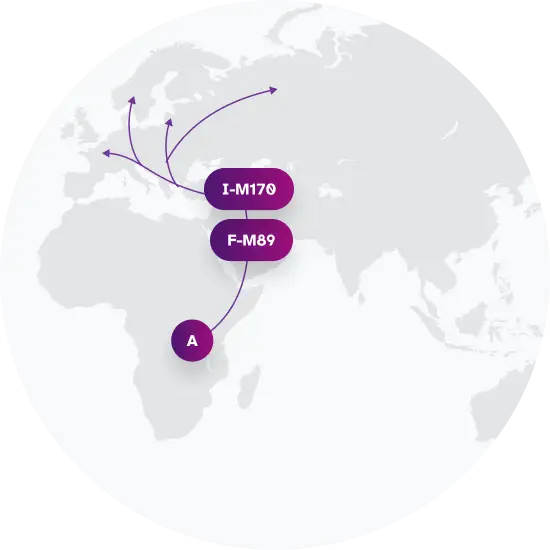Haplogroup I-CTS6397
What is Paternal Haplogroup I-CTS6397?
Haplogroup I-CTS6397, also known as Haplogroup I-M170 (Y Chromosome Consortium long-form label), is a genealogical group of lineages defined by unique genetic markers present on the Y-chromosome. Your paternal haplogroup, or that of your father if you do not have a Y-chromosome, paints a picture of your ancient origins and the migrations of your ancestors. Although your paternal haplogroup reflects just one of your many ancestral lineages, it carries information about that lineage over tens of thousands of years.
Haplogroup I-CTS6397 is descended from haplogroup I-M170. Among 23andMe research participants, haplogroup I-CTS6397 is commonly found among populations in the United Kingdom.
It's important to note that your haplogroup doesn't define your current ethnic identity; rather, it provides an insight into your deep ancestry on the paternal side.
 Paternal Haplogroup Origins I-M170
Paternal Haplogroup Origins I-M170Top Surnames with Haplogroup I-CTS6397
For surnames with sufficient representation in the data, these percentages represent the frequency with which each surname is found in individuals exhibiting this genetic marker.
Haplogroup I-CTS6397 is linked to the people of Doggerland
One of the places that was repopulated as the Ice Age waned no longer exists. During the Ice Age and for some time afterward, lower sea levels exposed much of the area that is now covered by the North Sea. Known as "Doggerland," the region must have been occupied by men bearing haplogroup I, because today it is abundant in all of the countries surrounding the North Sea.As the meltwaters of the retreating Ice Age glaciers caused sea levels to rise, the low-lying forests and wetlands of Doggerland gradually became inundated. The inhabitants of Doggerland retreated to the higher ground that is now the North Sea coast. I-M253 is especially common today in Scandinavia — it reaches levels of 33% in Denmark and Sweden — and is somewhat common in England, Germany and the Netherlands, where it is found in about 15% of men.

